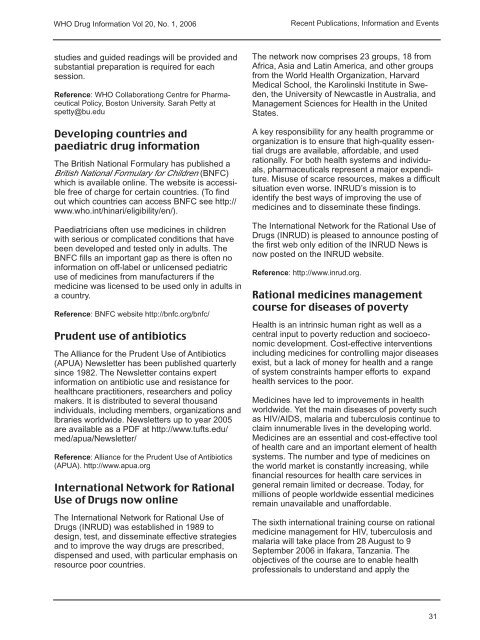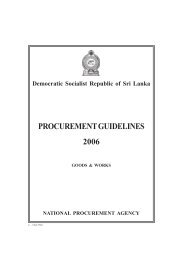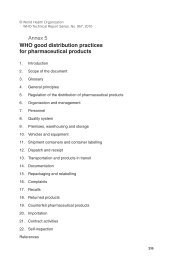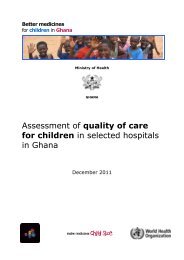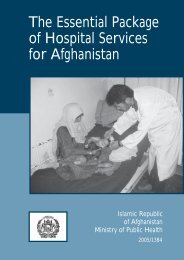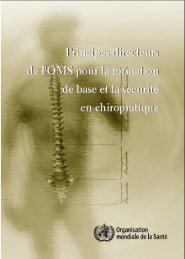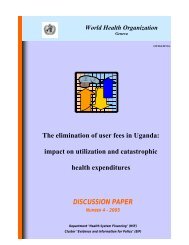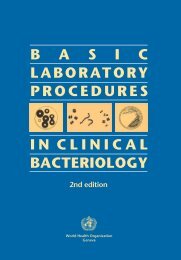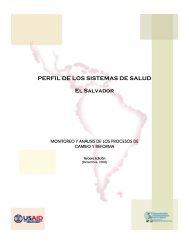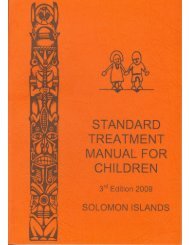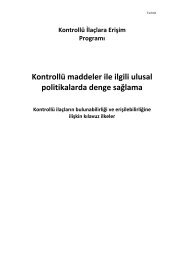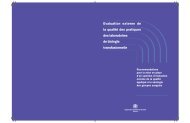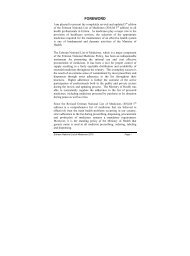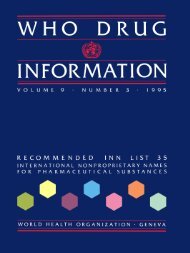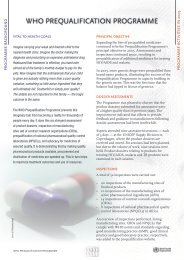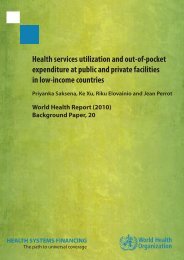WHO Drug Information Vol. 20, No. 1, 2006 - World Health ...
WHO Drug Information Vol. 20, No. 1, 2006 - World Health ...
WHO Drug Information Vol. 20, No. 1, 2006 - World Health ...
Create successful ePaper yourself
Turn your PDF publications into a flip-book with our unique Google optimized e-Paper software.
<strong>WHO</strong> <strong>Drug</strong> <strong>Information</strong> <strong>Vol</strong> <strong>20</strong>, <strong>No</strong>. 1, <strong>20</strong>06Recent Publications, <strong>Information</strong> and Eventsstudies and guided readings will be provided andsubstantial preparation is required for eachsession.Reference: <strong>WHO</strong> Collaborationg Centre for PharmaceuticalPolicy, Boston University. Sarah Petty atspetty@bu.eduDeveloping countries andpaediatric drug informationThe British National Formulary has published aBritish National Formulary for Children (BNFC)which is available online. The website is accessiblefree of charge for certain countries. (To findout which countries can access BNFC see http://www.who.int/hinari/eligibility/en/).Paediatricians often use medicines in childrenwith serious or complicated conditions that havebeen developed and tested only in adults. TheBNFC fills an important gap as there is often noinformation on off-label or unlicensed pediatricuse of medicines from manufacturers if themedicine was licensed to be used only in adults ina country.Reference: BNFC website http://bnfc.org/bnfc/Prudent use of antibioticsThe Alliance for the Prudent Use of Antibiotics(APUA) Newsletter has been published quarterlysince 1982. The Newsletter contains expertinformation on antibiotic use and resistance forhealthcare practitioners, researchers and policymakers. It is distributed to several thousandindividuals, including members, organizations andlbraries worldwide. Newsletters up to year <strong>20</strong>05are available as a PDF at http://www.tufts.edu/med/apua/Newsletter/Reference: Alliance for the Prudent Use of Antibiotics(APUA). http://www.apua.orgInternational Network for RationalUse of <strong>Drug</strong>s now onlineThe International Network for Rational Use of<strong>Drug</strong>s (INRUD) was established in 1989 todesign, test, and disseminate effective strategiesand to improve the way drugs are prescribed,dispensed and used, with particular emphasis onresource poor countries.The network now comprises 23 groups, 18 fromAfrica, Asia and Latin America, and other groupsfrom the <strong>World</strong> <strong>Health</strong> Organization, HarvardMedical School, the Karolinski Institute in Sweden,the University of Newcastle in Australia, andManagement Sciences for <strong>Health</strong> in the UnitedStates.A key responsibility for any health programme ororganization is to ensure that high-quality essentialdrugs are available, affordable, and usedrationally. For both health systems and individuals,pharmaceuticals represent a major expenditure.Misuse of scarce resources, makes a difficultsituation even worse. INRUD’s mission is toidentify the best ways of improving the use ofmedicines and to disseminate these findings.The International Network for the Rational Use of<strong>Drug</strong>s (INRUD) is pleased to announce posting ofthe first web only edition of the INRUD News isnow posted on the INRUD website.Reference: http://www.inrud.org.Rational medicines managementcourse for diseases of poverty<strong>Health</strong> is an intrinsic human right as well as acentral input to poverty reduction and socioeconomicdevelopment. Cost-effective interventionsincluding medicines for controlling major diseasesexist, but a lack of money for health and a rangeof system constraints hamper efforts to expandhealth services to the poor.Medicines have led to improvements in healthworldwide. Yet the main diseases of poverty suchas HIV/AIDS, malaria and tuberculosis continue toclaim innumerable lives in the developing world.Medicines are an essential and cost-effective toolof health care and an important element of healthsystems. The number and type of medicines onthe world market is constantly increasing, whilefinancial resources for health care services ingeneral remain limited or decrease. Today, formillions of people worldwide essential medicinesremain unavailable and unaffordable.The sixth international training course on rationalmedicine management for HIV, tuberculosis andmalaria will take place from 28 August to 9September <strong>20</strong>06 in Ifakara, Tanzania. Theobjectives of the course are to enable healthprofessionals to understand and apply the31


